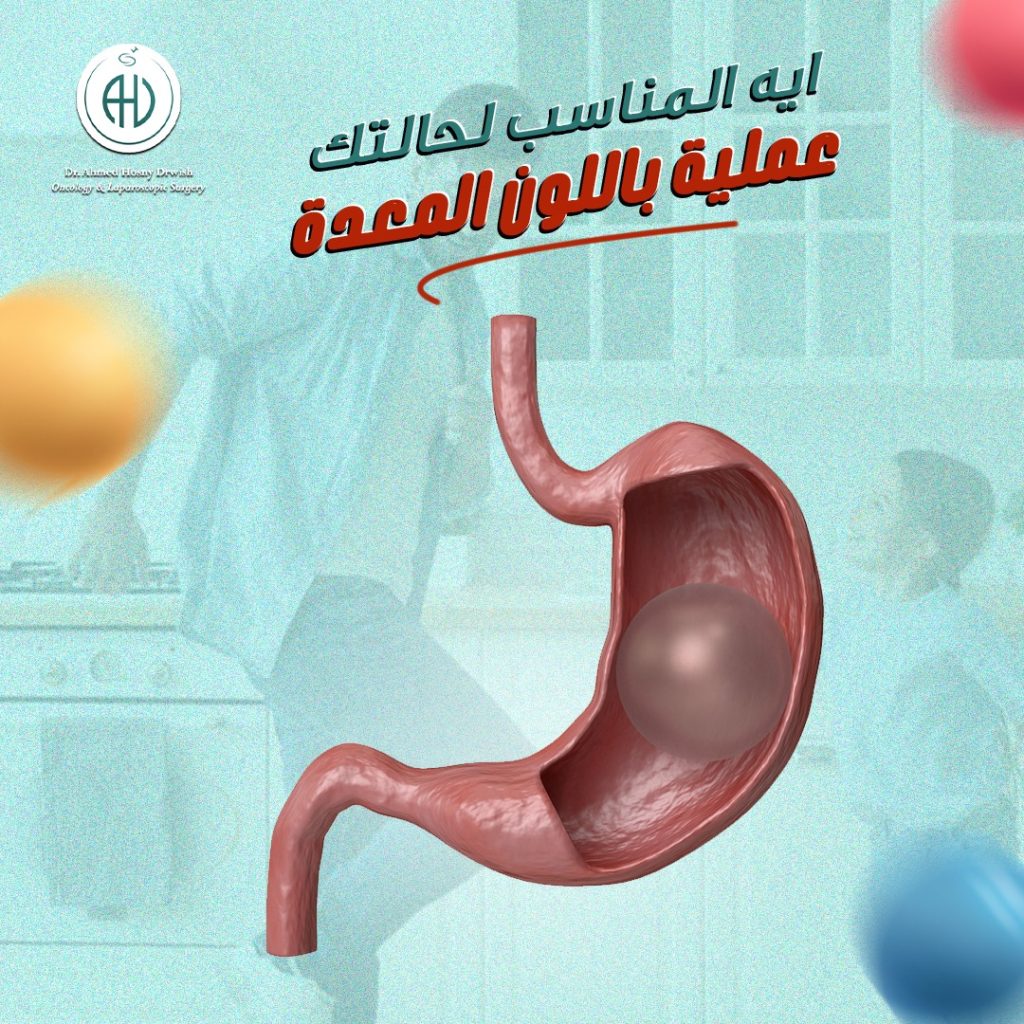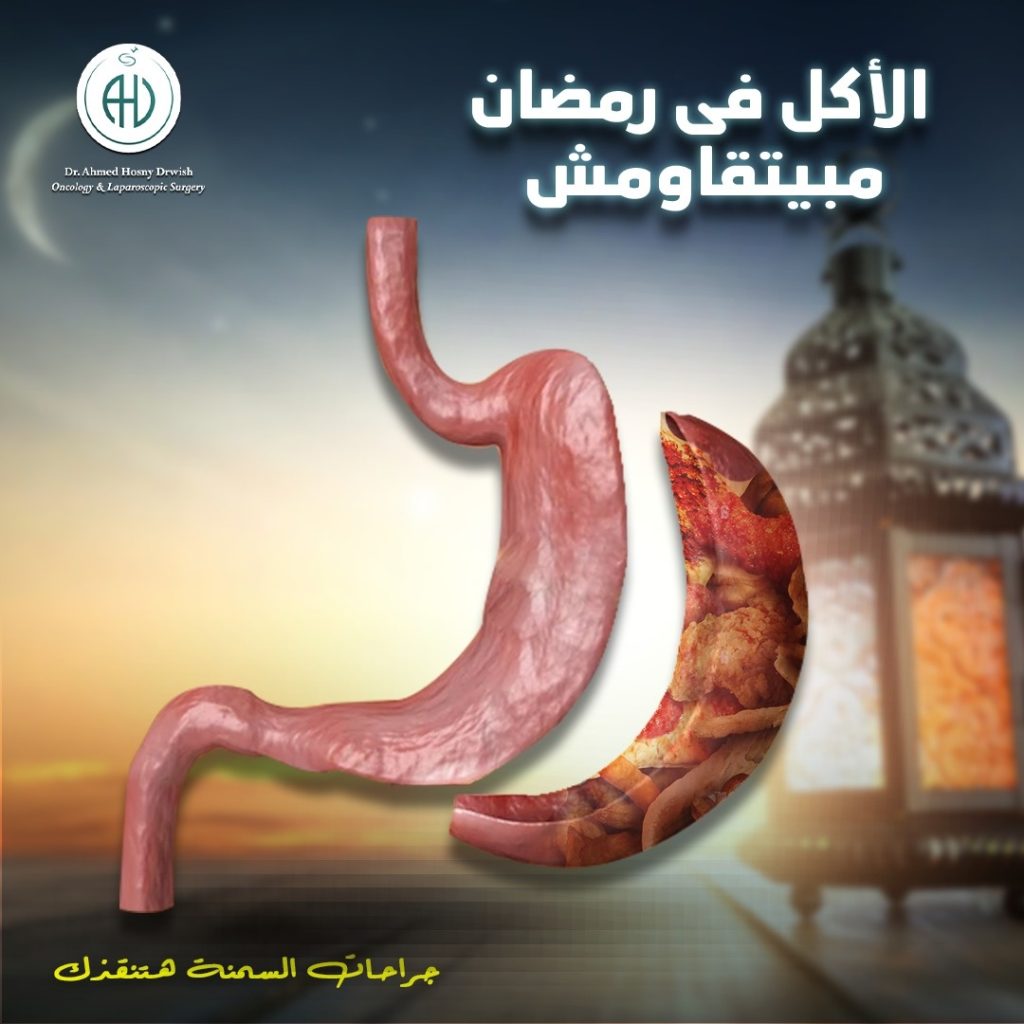Laparoscopic gastric stapling (advantages-disadvantages)
تعد stomach stapling process One of the old and traditional bariatric operations and surgeries, which proved successful for a while, but after a while, bariatric surgeries developed and there are operations that save time and pain, and the results are definitely better, so we will explain later what is stomach stapling and what is the difference between it and sleeve gastrectomy and what are the alternatives available to it. And the most important answers about operations Stomach stapling and sleeve gastrectomy with Dr. Ahmed Hosny
What is the laparoscopic gastric stapling process?
The idea of the stapling process is based on the idea of making a new small stomach in the upper part of the stomach by stapling the anterior and posterior stomach wall with making a small opening for this new stomach and placing a net around the opening of the new stomach. After stomach stapling, a person feels full after eating a very small meal.
What are the most important differences between gastric stapling and gastric sleeve?
- In gastric sleeve gastrectomy, 75% to 85% of the stomach is removed, and this reduces the amount of food and the hunger hormone decreases, so the person does not feel hungry after the sleeve. As for the process of stapling the stomach, a new stomach is made with staplers without cutting or excision of the stomach. Weight and get rid of excessive excess.
- Frequent reflux and gastroesophageal reflux disease are common problems after gastric stapling, while they are very rare after gastric sleeve.
Stomach stapling is no longer from obesity surgery Which we recommend for the treatment of obesity at the present time, because weight rebound occurs after two years of the stomach stapling procedure for 50% of those who performed the stapling, and a large percentage of those who performed the stomach stapling process suffer from frequent reflux, difficulty eating proteins and reflux esophagus.
1- Is gastric sleeve surgery performed laparoscopically?
Yes, the operation is performed using an endoscope (we use the latest advanced high-resolution endoscope in Egypt)
2- What are the types of staplers used in laparoscopic sleeve gastrectomy?
They are modern staplers made of titanium metal, an inert metal that does not interact with the body and has been used for decades in surgical operations and has no negative effect. We are keen to use American staplers that were manufactured in the United States of America and have been used in obesity surgery centers in America and Europe for decades. You can find out the type of smart stapler and its cost
3- What is the fate of the pins on the edge of the stomach? Does it have an effect on the body or when doing an MRI?
A month after the operation, the stomach is 100% healed, and the presence of the staples in the stomach is worthless and does not cause any problems. It also does not interfere with an MRI scan.
4- Is the use of staplers an obstacle in airports?
It does not constitute any hindrance.
5- Does the quality and efficiency of the endoscope used in the laparoscopic sleeve gastrectomy process affect the results?
Of course, in advanced endoscopic operations, it is preferable that the endoscope used be a high-resolution (HD) endoscope. It uses a high-resolution endoscope with very advanced capabilities, and it is considered one of the most modern endoscopes in Egypt.
6- What are the required tests before the operation?
CBC
Creatinine, Uric acid - F.B.G -ALT, AST, GGT, Bil. Total
Thyroid function tests
Hemophilia
ECG
CT- MRI - ERCP
7- What is the purpose of these examinations?
The anesthesiologist needs a careful assessment of the health status before performing the operation. He needs to know that the thyroid gland functions are normal, and if the patient has diabetes or if the heart is healthy, etc. so that the surgeon and the anesthesiologist are reassured and that due precautions are taken during the operation.
8- How long will I stay in the hospital?
just one day
9- Will I feel pain after the operation?
The pain after the sleeve gastrectomy is limited compared to traditional surgeries, and this is one of the most important benefits of using laparoscopy in obesity surgeries. After the operation, we try to control the pain through analgesics in order to speed up the recovery period. Most patients are surprised that they do not feel post-operative pain, and the degree of tolerance varies from person to person.
10- When can I walk after laparoscopic sleeve gastrectomy?
Two hours after the operation, the person walks in the hospital manner. It is also recommended to walk every two hours throughout his stay in the hospital. This is one of the most important benefits of using the endoscope in bariatric surgeries, as walking after the operation to avoid sleeping in the bed for long periods prevents many complications from occurring.
11- When is stool expected?
3-5 days upon discharge from the hospital.
12- What is the percentage of pain when leaving the hospital?
The degree of tolerance varies from person to person, but usually it is a very weak pain and can be controlled with an analgesic for two or three days.
13- Do you use the Drainage tube during the convalescence period?
The Drainage tube is not used in most sleeve gastrectomy
14- What do I do when constipation becomes a problem?
1- Drink a lots of fluids
2- Sports helps to get regular outing
3- You can take a laxative when you feel excessive constipation
15- When can I drive a car?
In most cases, it is possible to return to normal activity after a week has passed, and therefore the car can be driven after this period.
16- Do I take vitamins after laparoscopic sleeve gastrectomy?
It is recommended to take vitamins in the first year in order to compensate for the body's needs for minerals and vitamins.
17- Does the stomach expand after the operation?
This question is repeated constantly, but the increase in the size of the stomach depends mostly on the amount of food that the individual eats. If the amount is constantly in excess of the sufficient amount for the stomach, this helps to expand the stomach in the first months after the operation, and therefore it is advised to stop eating when feeling the first fullness. There are special cases of gastric dilation and leakage after bariatric surgery
18- We often hear that the process of longitudinal reduction after a period of time regains a person's weight again. Is this true?
The initial results of this process are very promising. As for regaining weight again, this depends on the healthy behavior of eating food. If the calories in eating increased by eating sugars and foods rich in fat, this helps to regain weight again. As for adhering to the advice related to nutrition, it ultimately leads to maintaining prolonged weight.
19- Is it possible to eat anything after the operation?
It is recommended to reduce sweets and foods rich in fat until we reach the ideal weight.
20- How do I protect the stomach from expanding?
Do not eat after feeling full.
21- Will I ever eat normally again?
After the operation, you can eat anything in small quantities.
22- What are the reasons that make some people gain weight after the operation?
Sleeve gastrectomy is an operation that is not suitable for obese patients, addicts and sweet lovers. If it is performed for these people, it often fails.
23- Is there a problem for pregnancy later after the longitudinal excision - sleeve gastrectomy?
It is recommended that pregnancy be after at least a year so that the body can adapt to the reduction in the digestive system and the amount of food; It is necessary to take vitamins and iron, especially calcium, regularly after the operation, and then we do a comprehensive examination and after it is possible to become pregnant safely; The pregnant woman may need additional doses of iron and calcium by consulting a nutritionist, but if pregnancy takes place for any circumstances during the first year, the pregnant woman must have a close follow-up with the nutritionist to ensure that she eats rich and useful foods for the fetus and often the fetus is normal



